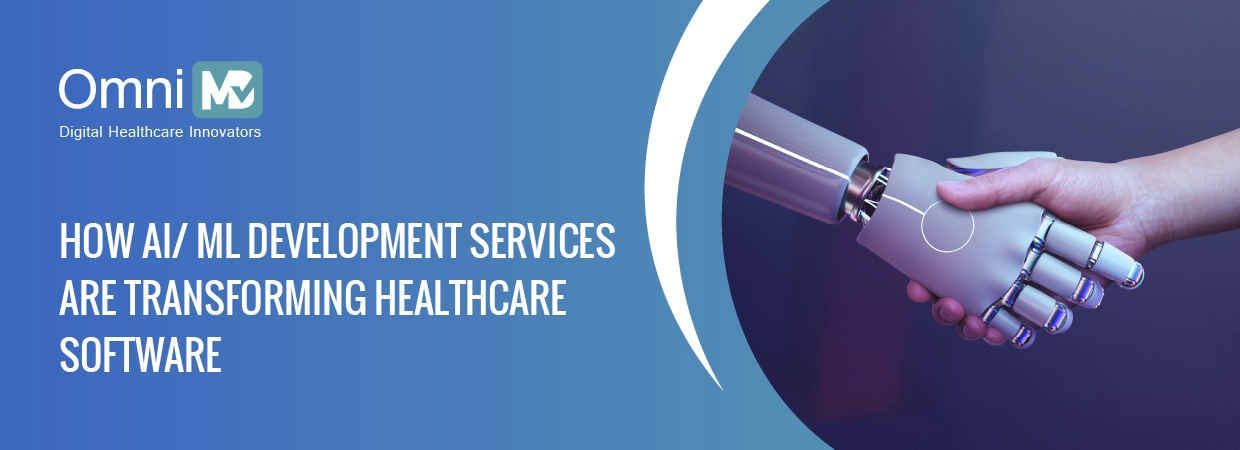How AI/ ML Development Services are Transforming Healthcare Software
As the healthcare landscape evolves at an unprecedented pace, the integration of technological advancements is becoming critical for enhancing patient care. Among these innovations, AI (Artificial Intelligence) and ML (Machine Learning) development services are at the forefront, reshaping the way healthcare is delivered. These technologies not only represent the future of healthcare but are actively being incorporated into various aspects of the industry, unlocking opportunities for better patient outcomes, streamlined clinical workflows, and optimized operational efficiencies.
According to a report by Fortune Business Insights, the global healthcare AI market is projected to reach USD 208.2 billion by 2028, growing at a CAGR of 37.6% from 2021 to 2028. This remarkable growth highlights the increasing importance of AI and ML in transforming healthcare systems worldwide.
What is AI and ML Development Services in Healthcare
AI in healthcare is the utilization of machine learning (ML) algorithms and other cognitive technologies in medical settings. AI involves computers and machines mimicking human cognition, including learning, thinking, and decision-making. In healthcare, this means leveraging AI to analyze and act on medical data, often to predict specific outcomes.
One notable application of AI in healthcare is using ML and cognitive technologies for medical diagnoses. By analyzing patient data and other relevant information, AI can assist doctors and medical providers in making more accurate diagnoses and creating effective treatment plans. In addition, AI enables a more predictive and proactive approach to healthcare by analyzing large datasets to develop better preventive care recommendations for patients. Therefore, nowadays most of the healthcare providers are hiring AI & ML development company to create cutting-edge automated software for better patient care.

Importance of AI and ML in Healthcare
AI and ML are revolutionizing the healthcare sector by offering numerous advantages that enhance patient care and operational efficiency:
- Enhanced Diagnosis and Treatment: AI and ML improve diagnostic accuracy by analyzing vast datasets to identify patterns that may elude human analysis. A study by JAMA Internal Medicine found that AI algorithms can diagnose skin cancer with a 91% accuracy, surpassing human dermatologists at 87%.
- Predictive Analytics: AI empowers healthcare providers to anticipate disease outbreaks and patient outcomes. For example, ML models have been used to predict the spread of COVID-19, aiding in timely interventions.
- Operational Efficiency: By automating administrative tasks, AI reduces the burden on healthcare staff and minimizes errors. Research shows that AI can reduce administrative costs by up to 30%, enabling healthcare organizations to allocate resources more effectively.
- Personalized Medicine: AI facilitates precision medicine by analyzing individual genetic and environmental factors. This leads to more effective therapies tailored to the unique needs of each patient.
- Cost Reduction: Through optimization of diagnostic and treatment processes, AI can lower healthcare costs while maintaining high standards of care. A report by McKinsey estimates that AI could potentially save the U.S. healthcare system up to $150 billion annually.
- Improved Patient Engagement: AI-driven tools, such as chatbots and virtual health assistants, enhance patient engagement by providing timely information and reminders. A study found that AI-driven health assistants improved medication adherence by 50%.
Applications of AI and ML Development Services in Healthcare

Artificial Intelligence (AI) and Machine Learning (ML) have transformed the healthcare sector and it is beneficially affecting doctors, hospitals, insurance companies, and related industries. These advancements have often resulted in more positive and substantial impacts compared to other fields.
Below are the major applications of Artificial Intelligence (AI) and Machine Learning (ML) in the healthcare domain.
- Managing Medical Records and Other Data
The initial step in healthcare involves compiling and analyzing information such as medical records and patient history. Data management is the most prevalent application of artificial intelligence and digital automation. Robots handle the collection, storage, reformatting, and tracking of data which provides faster and more consistent access.
- Performing Repetitive Tasks
Tasks like analyzing tests, X-rays, CT scans, and data entry can be completed more quickly and accurately by robots. In cardiology and radiology, the sheer volume of data can be overwhelming. Hence, in future, cardiologists and radiologists can focus on the most complex cases where human oversight is crucial.
- Treatment Design
AI systems are developed to analyze various data sources—patient file notes, external research, and clinical expertise—to help determine the personalized treatment plan.
- Digital Consultations
Many AI-based apps are providing medical consultations based on personal medical history and general medical knowledge. Users input their symptoms, and the app uses speech recognition to compare them against a database of illnesses which recommends actions based on the user’s medical history.
- Virtual Nurses
Nowadays healthcare domain is coming up with virtual nurses such as Molly by Sense.ly a digital nurse that monitors patient conditions and follows up on treatments between doctor visits. Such programs use machine learning to assist patients, particularly those with chronic illnesses. Such conversational apps provide basic health information and advice to patients and answer their questions about medications and whether symptoms require a doctor visit.
- Medication Management
The National Institutes of Health developed the AiCure app to monitor medication adherence. A smartphone’s webcam works with AI to ensure patients are taking their prescriptions which helps them manage their conditions. It is particularly useful for those with serious medical conditions, patients who often disregard medical advice, and participants in clinical trials.
- Drug Development
Developing new drugs through clinical trials can take over a decade and cost billions. AI can speed up this process. For instance, during the Ebola virus scare, an AI program scanned existing medicines to find potential treatments, identifying two medications that could reduce Ebola infectivity in just one day—a process that usually takes months or years.
- Precision Medicine
Genetics and genomics research focuses on finding mutations and disease links within DNA. AI supports the early detection of cancer and vascular diseases through body scans and predicts potential health issues based on genetic information.
- Health Monitoring
Wearable health trackers from companies like Fitbit, Apple, and Garmin monitor heart rates and activity levels. These devices can prompt users to exercise more and share data with doctors (and AI systems) for a better understanding of patient needs and habits.
- Healthcare System Analysis
AI can generate healthcare digital invoices to analyze data for errors in treatments, and workflow inefficiencies, and to prevent unnecessary hospitalizations.

How AI and ML Development Services Reshaping Healthcare Industry for Future
AI and ML development services are upgrading healthcare industry for more efficient, accurate, and personalized care.
Here are key ways in which AI and ML development services is being useful for the future of healthcare:
- AI/ML Enhances Biopharma Revenue
The biopharma industry is leveraging AI/ML across various domains, including drug discovery, clinical development, manufacturing, and physician-patient interactions. AL and ML can reduce drug development timelines, lower R&D costs, and improve patient success rates.
Incorporating AI/ML in R&D and manufacturing will enable companies to scale improvements and identify new automation opportunities.
As healthcare providers adopt advanced technologies, considerations such as health insurance for businesses become increasingly important to ensure comprehensive coverage for both tech investments and employee benefits in evolving clinical settings.
- Enhanced Delivery of Care
AI/ML can drive significant changes and efficiencies in healthcare services. Predictive capabilities of these tools help healthcare providers detect and diagnose diseases faster which gives them more time with patients and potentially improves patient satisfaction and health outcomes.
Benefits for providers include improved patient access, accurate diagnostics, efficient claims processing, and better supply chain management. For patients, AI can support treatment management, finding the best insurance channels, locating affordable pharmacies, and enhancing telehealth and disease detection services.
Analysts predict AI will streamline care delivery, coordination, and reimbursement, benefiting companies focused on diagnostics, patient care, and electronic health records.
- Leveraging Data for Advanced Diagnostics
AI/ML tools are crucial in analyzing minute biological components and diagnosing diseases which results in better care and new business opportunities. The adoption of next-generation sequencing and electronic health records has facilitated advanced diagnostics by integrating genomic data with health records and medical imaging.
AI/ML will be increasingly important for companies aiming to leverage complex datasets to gain competitive advantages, develop new products, and advance personalized medicine and patient care.
Analysts view diagnostics as a prime area for AI/ML investment. Companies focusing on less invasive procedures may see reduced demand as AI identifies and treats illnesses earlier.
Smart devices and monitoring technology also present investment opportunities. AI can analyze patient data from devices, detect abnormalities, recommend treatments, and monitor health continuously. In the future, smart implants could enable providers to track patient recovery remotely.
The Ending Note
The integration of AI and ML development services into healthcare is ushering in a new era of patient care. These technologies enhance diagnostic accuracy, streamline administrative processes, and enable personalized treatment plans, leading to improved patient outcomes.
AI’s capacity to analyze vast amounts of data allows for early disease detection and more effective treatment options. As healthcare providers increasingly adopt these advanced technologies, the industry will witness enhanced efficiency, precision, and patient satisfaction. The future of medicine is becoming more responsive, predictive, and patient-centered, thanks to the transformative power of AI and ML.
If your healthcare organization is ready to embrace these advancements, consider partnering with a leading AI and ML development company to harness the full potential of these technologies and transform your patient care approach.

All-in-One EHR Software
Streamline Your Practice with a Complete EHR Solution

 Written by Neha Singh
Written by Neha Singh
 Reviewed by Shivani Joshi
Reviewed by Shivani Joshi